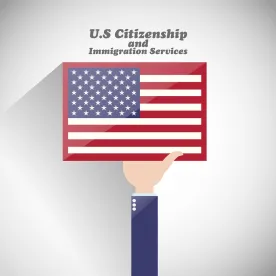H-1B Cap Selection Process
On January 8, 2021, U.S. Citizenship and Immigration Services (USCIS) published a final rule modifying the H-1B cap selection process. This rule changes the H-1B cap selection process by replacing the random selection process with a wage-level-based selection process, giving preference to petitions using a Level IV wage and proceeding in descending order with wage levels III, II and I. This affects only new, cap-subject H-1B petitions. It does not affect people who currently hold H-1B status. The rule is scheduled to go into effect 60 days after publication (March 9, 2021), however, it is unclear if it will be implemented in time for this year’s cap process. A few things could derail or delay the rule including:
-
The final rule is scheduled to go into effect on March 9, 2021, which could be after the registration process opens.
-
The Biden administration could delay implementation. The transition team has indicated that the new administration will issue a memorandum on January 20, 2021, delaying implementation of any regulations that were issued since the election but had not yet gone into effect. It is anticipated that the Biden administration will adopt a 60-day delayed effective date for such regulations. How this will affect this rule will depend on how the memorandum is worded. It could delay the rule to either March 21, 2021 (sixty days from the date of the presidential memorandum), or May 8, 2021 (sixty days from the regulation’s effective date as published in the Federal Register).
-
The rule will likely be litigated, which could affect when and if it goes into effect.
DOL Final Rule on Computation of Prevailing Wage Levels
On January 14, 2021, the U.S. Department of Labor issued a final rule adopting changes from their interim final rule (IFR) from October 2020. The October IFR was struck down by a U.S. district court. The purpose of the rule is to “update the computation of prevailing wage levels under the existing four-tier wage structure to better reflect the actual wages earned by U.S. workers similarly employed to foreign workers.” This rule, like the H-1B cap rule, will go into effect 60 days after publication in the Federal Register, but will be covered by the 60-day delayed effective date outlined above.
The rule amends existing regulations governing permanent labor certifications and labor condition applications (LCAs). Specifically, the rule will change the computation of prevailing wage levels, resulting in higher prevailing wages for all occupations for each OES-based wage level. Wages will now be calculated as follows:
-
Level I Wage: 35th percentile (from 17th percentile)
-
Level II Wage: 53rd percentile (from 34th percentile)
-
Level III Wage: 72nd percentile (from 50th percentile)
-
Level IV Wage: 90th percentile (from 67th percentile)
The rule will be phased in, starting in July 2021. The rule will take full effect by July 2024.
We expect the new rules will face legal challenges and could be placed on hold by the Biden White House. The transition team for President-elect Joe Biden announced that he plans to issue a memo, effective January 20, 2021, that will halt or delay actions by President Trump’s administration that will not have taken effect by inauguration day. The memo would apply to regulations and guidance documents that have either not been published in the Federal Register or set an effective date after January 20, 2021.
H-1B Cap Registration and Planning
Even with the proposed changes outlined above, it is time to start planning for the FY2022 H-1B cap season. Although exact dates have not been announced for the H-1B registration program, it is expected that the registration process will look similar to last year’s process.
Before filing a cap-subject H-1B petition, USCIS requires that employers or their authorized representatives first complete an online registration for each petition. USCIS will then run the H-1B cap lottery (if needed) based on these registrations. Employers would only file petitions based on selected registrations. Assuming the process runs like last year, the lottery will be run no later than March 31, 2021, and employers will then have 90 days to file a cap-subject petition for selected registrations.
It is anticipated that, as in prior years, the H-1B cap will be met once the registration system opens, and the H-1B cap selection process or lottery will again be conducted. Although the registration system will only require basic information about the company and beneficiary, employers should analyze each case to ensure it is approvable. Steps to take before registration may include:
-
Identifying employees for whom a registration will be submitted
-
Analyzing education to see if the beneficiary will qualify under the U.S. master’s degree cap exemption
-
Obtaining credential evaluations for non-U.S. degrees
-
Reviewing and analyzing immigration status
-
Preparing LCAs
-
Obtaining detailed job descriptions
The electronic registration system was a significant change for the H-1B cap system. Last year’s process ran relatively smoothly.
International Travel Update and Termination of Travel Restrictions from United Kingdom, Brazil and Schengen Countries
On January 12, 2021, the Centers for Disease Control announced that starting on January 26, 2021, international travelers entering the U.S. will be required to present a negative COVID-19 test or documentation of recovery before being able to board their flight. This new requirement will apply to all air passengers, two years of age or older, traveling into the U.S., including U.S. citizens and legal permanent residents. Air passengers are required to get a viral test (a test for current infection) within the three days before their flight to the U.S. departs.
On January 18, 2021, President Trump issued an executive order terminating the 14-day travel restriction for people traveling from the United Kingdom, Brazil and Schengen countries as long as they have a negative COVID result. The termination is set to go into effect on January 26, 2021. It is unclear if President Biden will allow the termination to stand.
Extensions of Immigration Executive Orders
President Trump extended executive orders restricting employment-based immigration that were originally set to expire on December 31, 2020. These executive orders suspend the entry of individuals to the U.S. from several non-immigrant visa categories and the issuance of immigrant visas to green card applicants outside of the U.S., with limited exceptions. The executive orders have been extended through March 31, 2021. President-elect Biden can rescind the executive orders after taking office on January 20, 2021; however, he has not yet confirmed whether he will do so.






 />i
/>i
